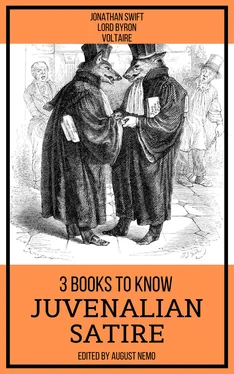Have such a charm for us poor human creatures?
I hate inconstancy—I loathe, detest,
Abhor, condemn, abjure the mortal made
Of such quicksilver clay that in his breast
No permanent foundation can be laid;
Love, constant love, has been my constant guest,
And yet last night, being at a masquerade,
I saw the prettiest creature, fresh from Milan,
Which gave me some sensations like a villain.
But soon Philosophy came to my aid,
And whisper'd, 'Think of every sacred tie!'
'I will, my dear Philosophy!' I said,
'But then her teeth, and then, oh, Heaven! her eye!
I'll just inquire if she be wife or maid,
Or neither—out of curiosity.'
'Stop!' cried Philosophy, with air so Grecian
(Though she was masqued then as a fair Venetian);
'Stop!' so I stopp'd.—But to return: that which
Men call inconstancy is nothing more
Than admiration due where nature's rich
Profusion with young beauty covers o'er
Some favour'd object; and as in the niche
A lovely statue we almost adore,
This sort of adoration of the real
Is but a heightening of the 'beau ideal.'
'T is the perception of the beautiful,
A fine extension of the faculties,
Platonic, universal, wonderful,
Drawn from the stars, and filter'd through the skies,
Without which life would be extremely dull;
In short, it is the use of our own eyes,
With one or two small senses added, just
To hint that flesh is form'd of fiery dust.
Yet 't is a painful feeling, and unwilling,
For surely if we always could perceive
In the same object graces quite as killing
As when she rose upon us like an Eve,
'T would save us many a heartache, many a shilling
(For we must get them any how or grieve),
Whereas if one sole lady pleased for ever,
How pleasant for the heart as well as liver!
The heart is like the sky, a part of heaven,
But changes night and day, too, like the sky;
Now o'er it clouds and thunder must be driven,
And darkness and destruction as on high:
But when it hath been scorch'd, and pierced, and riven,
Its storms expire in water-drops; the eye
Pours forth at last the heart's blood turn'd to tears,
Which make the English climate of our years.
The liver is the lazaret of bile,
But very rarely executes its function,
For the first passion stays there such a while,
That all the rest creep in and form a junction,
Life knots of vipers on a dunghill's soil,—
Rage, fear, hate, jealousy, revenge, compunction,—
So that all mischiefs spring up from this entrail,
Like earthquakes from the hidden fire call'd 'central,'
In the mean time, without proceeding more
In this anatomy, I 've finish'd now
Two hundred and odd stanzas as before,
That being about the number I 'll allow
Each canto of the twelve, or twenty-four;
And, laying down my pen, I make my bow,
Leaving Don Juan and Haidee to plead
For them and theirs with all who deign to read.
––––––––

––––––––
Hail, Muse! et cetera.—We left Juan sleeping,
Pillow'd upon a fair and happy breast,
And watch'd by eyes that never yet knew weeping,
And loved by a young heart, too deeply blest
To feel the poison through her spirit creeping,
Or know who rested there, a foe to rest,
Had soil'd the current of her sinless years,
And turn'd her pure heart's purest blood to tears!
O, Love! what is it in this world of ours
Which makes it fatal to be loved? Ah, why
With cypress branches hast thou Wreathed thy bowers,
And made thy best interpreter a sigh?
As those who dote on odours pluck the flowers,
And place them on their breast—but place to die—
Thus the frail beings we would fondly cherish
Are laid within our bosoms but to perish.
In her first passion woman loves her lover,
In all the others all she loves is love,
Which grows a habit she can ne'er get over,
And fits her loosely—like an easy glove,
As you may find, whene'er you like to prove her:
One man alone at first her heart can move;
She then prefers him in the plural number,
Not finding that the additions much encumber.
I know not if the fault be men's or theirs;
But one thing 's pretty sure; a woman planted
(Unless at once she plunge for life in prayers)
After a decent time must be gallanted;
Although, no doubt, her first of love affairs
Is that to which her heart is wholly granted;
Yet there are some, they say, who have had none,
But those who have ne'er end with only one.
'T is melancholy, and a fearful sign
Of human frailty, folly, also crime,
That love and marriage rarely can combine,
Although they both are born in the same clime;
Marriage from love, like vinegar from wine—
A sad, sour, sober beverage—by time
Is sharpen'd from its high celestial flavour
Down to a very homely household savour.
There 's something of antipathy, as 't were,
Between their present and their future state;
A kind of flattery that 's hardly fair
Is used until the truth arrives too late—
Yet what can people do, except despair?
The same things change their names at such a rate;
For instance—passion in a lover 's glorious,
But in a husband is pronounced uxorious.
Men grow ashamed of being so very fond;
They sometimes also get a little tired
(But that, of course, is rare), and then despond:
The same things cannot always be admired,
Yet 't is 'so nominated in the bond,'
That both are tied till one shall have expired.
Sad thought! to lose the spouse that was adorning
Our days, and put one's servants into mourning.
There 's doubtless something in domestic doings
Which forms, in fact, true love's antithesis;
Romances paint at full length people's wooings,
But only give a bust of marriages;
For no one cares for matrimonial cooings,
There 's nothing wrong in a connubial kiss:
Think you, if Laura had been Petrarch's wife,
He would have written sonnets all his life?
All tragedies are finish'd by a death,
All comedies are ended by a marriage;
The future states of both are left to faith,
For authors fear description might disparage
The worlds to come of both, or fall beneath,
And then both worlds would punish their miscarriage;
So leaving each their priest and prayer-book ready,
They say no more of Death or of the Lady.
The only two that in my recollection
Have sung of heaven and hell, or marriage, are
Dante and Milton, and of both the affection
Was hapless in their nuptials, for some bar
Of fault or temper ruin'd the connection
(Such things, in fact, it don't ask much to mar):
But Dante's Beatrice and Milton's Eve
Were not drawn from their spouses, you conceive.
Some persons say that Dante meant theology
By Beatrice, and not a mistress—I,
Although my opinion may require apology,
Deem this a commentator's fantasy,
Unless indeed it was from his own knowledge he
Decided thus, and show'd good reason why;
I think that Dante's more abstruse ecstatics
Meant to personify the mathematics.
Haidee and Juan were not married, but
The fault was theirs, not mine; it is not fair,
Chaste reader, then, in any way to put
The blame on me, unless you wish they were;
Читать дальше













